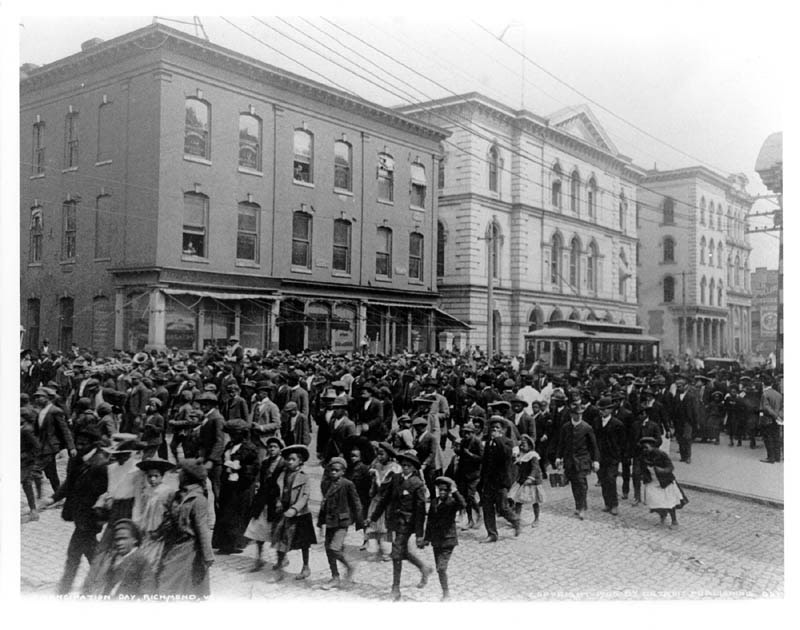We mark Juneteenth 2021 with this guest post from Daniel Bachman, Madison County artist and independent scholar interested in the folk histories of the Virginia experience.

Photograph “Emancipation Day, Richmond, VA April 3, 1905” / 37.102.P.018421 from the Detroit Publishing Company Collection, Collections of Henry Ford.
Although we now celebrate Juneteenth as Emancipation Day, historically, black Virginians honored April 3 & 9. Local historian Bessida Cauthorne White writes, “April 3, 1865, was the day that the City of Richmond fell to the Union Army, a military operation brought about largely through the efforts of African-American troops. April 9 was Emancipation Day in Lynchburg and in King William County, marking Robert E. Lee’s surrender at Appomattox on April 9, 1865.” In 1866, Richmond designated April 3 as Emancipation Day, which remained a major holiday for black Virginians in the city until they were suppressed during the Jim Crow era.
Tappahannock, however, held a large annual Third of April celebration through the mid-1950s. White writes, “A typical Third of April began with a parade through the streets of Tappahannock…Following the parade and a lunch break, the festivities resumed with a formal program in the Essex County Courthouse. There was always an inspirational featured speaker…Some of the older residents remember that a play was given on the evening of the Third of April during the early part of the twentieth century.” Local residents recalled that the annual celebration in Tappahannock was “our day, the one time that we took over the town.'”
“The fact that Black folk were able to keep the celebration going through the rise of Jim Crow, through the Great Depression, and through two world wars says much for the tenacity and perseverance of the African-American citizens of the area, and should not go unnoticed. It is ironic that a celebration that marked the fall of the City of Richmond was sustained in Tappahannock, but not in Richmond.”
-Bessida Cauthorne White, “History of the Third of April Emancipation Celebration in Essex County, Virginia,” Middle Peninsula African-American Genealogical & Historical Society, 1994.


Virginia had highest number of slaves compared to other states.
Sorry, I was replying not to the fine article, but to Gauron’s comment about Va.’s having the highest number of enslaved. It’s an interesting fact, with deep implications not directly touched on in the article. But those numbers had hugely tragic consequences, enabling Virginia to have more electoral votes than Pennsylvania or even Massachusetts (which had a larger white population than Va.), thanks to Madison’s cleverly pushing the 3/5ths proportional representation into the text of the Constitution while censoring the very word “slavery.” And with Lincoln’s assassination and Southerner VP turning President Andrew Johnson granting blanket unearned amnesty to unrepentant Confederate leaders, it wouldn’t be long before a compromising situation would arise (1876 Hayes election) leading to withdrawal of federal troops from the South, triggering the insane genocidal revival of white American racist empire all over again. (Interesting aside: Northern and Southern officers at Civil War’s end not infrequently renewed their pre-secession West Point friendships that had been aborted by the 1861 secessions compelling Southern West Pointers to join their slave-dependent states’ insurrection against the Union. Their local provincial loyalties trumped their national patriotism.
Our late 20th c. schools did a terrible job — and the Supreme Court hasn’t helped much — teaching any of these nuances of white privilege and supremacist ideologies in our history. Learning about the sexist tradition in our fair republic of men’s legal entitlement to routinely abuse wives and children hasn’t fared much better from our public education whether K-12 or university level…. It’s no wonder even feminist-educated women find it hard to fathom why there are still so many men who are, by choice, and with legal and cultural impunity, violent and rapacious in our society. This has its roots in Virginia’s colonial elitist egocentrically permissive savagery. I know. I’ve studied my white ancestors a lot. Not a kind or generous crowd.
The article’s heartening premise, however, humbles folks like me, listening to the brilliance, bravery and lucid perseverance of generations of the enslaved and their equally courageous and undaunted descendants making America greater as a truly human culture than any ancestors I can name whose brutally enforced racial privilege I unconsciously inherited and have benefitted from for decades.